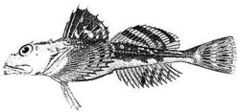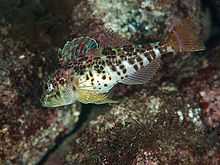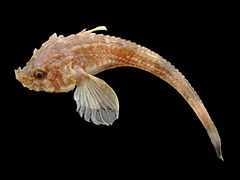Sculpin
From Wikipedia, the free encyclopedia
For the submarines, see USS Sculpin.
| Sculpin | |
|---|---|
 | |
| Myoxocephalus octodecemspinosus | |
| Scientific classification | |
| Kingdom: | Animalia |
| Phylum: | Chordata |
| Class: | Actinopterygii |
| Order: | Scorpaeniformes |
| Suborder: | Cottoidei |
| Superfamily: | Cottoidea |
| Families | |
|
11 | |
A sculpin is a fish that belongs to the superfamily Cottoidea in the order Scorpaeniformes.[1] As of 2006, this superfamily contains 11 families, 149 genera, and 756 species.[2]
Sculpins occur in many types of habitat, including ocean and freshwater zones. They live in rivers, submarine canyons, kelp forests, and shallow littoral habitat types, such as tidepools.[1]
Sculpins are benthic fish, dwelling on the bottoms of water bodies. Their pectoral fins are smooth on the upper edge and webbed with sharp rays along the lower edge, a modification that makes them specialized for gripping the substrate. This adaptation helps the fish anchor in fast-flowing water.[1]
Families
Families include:[3]
- Abyssocottidae: deep-water sculpins (24 species)
- Agonidae (47 spp.)
- Bathylutichthyidae: the Antarctic sculpin (1 sp.)
- Comephoridae: Baikal oilfishes (2 spp.)
- Cottidae: common sculpins (258 spp.)
- Ereuniidae: deepwater bullhead sculpins (3 spp.)
- Hemitripteridae: sea ravens, sailfin sculpins (8 spp.)
- Psychrolutidae: fatheads (40 spp.)
- Rhamphocottidae: the grunt sculpin (1 sp.)
Gallery
-

Ambophthalmos angustus
References
- ↑ 1.0 1.1 1.2 Kane, E. A. and T. E. Higham. (2012). Life in the flow lane: differences in pectoral fin morphology suggest transitions in station-holding demand across species of marine sculpin. Zoology (Jena) 115(4), 223-32.
- ↑ Nelson, J. S. (2006) Fishes of the World. 4th Ed. Hoboken, New Jersey: John Wiley & Sons.
- ↑ Froese, R. and D. Pauly. (Eds.) Order Summary for Scorpaeniformes. FishBase. 2011.
This article is issued from Wikipedia. The text is available under the Creative Commons Attribution/Share Alike; additional terms may apply for the media files.


.jpg)
